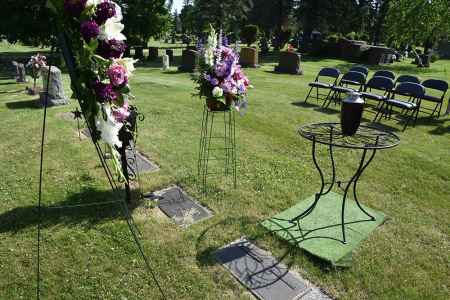Theology professor says cremation is OK for Christians so long as it's respectable

The cremation of a body after death can be an acceptable practice for Christians so long as it is done with respect, according to a theology professor.
Michael J. Svigel, chair of the Department of Theological Studies at Dallas Theological Seminary, talked about the issue of Christian burial on an episode of “The Table” podcast posted to YouTube on Monday.
Professor Svigel said that while he understood why some might consider cremation disrespectful toward the body, he countered that the same end result ensues with the body, be it traditional burial or cremation.
“In the end, if you were to practice a classic burial of a body in a grave, after about 10, 20 years, the body is reduced to bones, and after about 50 to 75 years or so, those bones are reduced to the basic elements,” explained Svigel.
“Ultimately, the same process that occurs in a cremation, except the cremation oxidation process takes one to two hours. So in the end, what you have is roughly the same elements of the body.”
Svigel believed that the greater questions were not centered on whether a family decided to bury or cremate a loved one, but rather “what are the motives behind it” and “what are you going to do with these remains that you have left?”
He supported what he called “a robust theology of the body and a proper understanding of our future hope, being resurrection,” which includes maintaining the identity of the deceased.
“I course, if someone needs to be cremated for whatever reason or is cremated, chooses that, I keep the remains identified and then inter that person’s remains in a plot that is marked. That would be my preference if a person chooses cremation,” continued Svigel.
“It is an act of confession of faith retaining the identity … I would say it is probably best Christian practice to retain the identity of those remains, whether it’s cremation or burial.”
Svigel warned against treating the body as simply a disposable shell, noting that “we were not created as spirits that just happened to indwell a body for some practical reasons, but nor are we merely a body.”
“We are both of these things together at the same time. That makes us who we are, and to emphasize one over the other is really not a Christian perspective on a human person,” he said.
“[The body] is not just garbage or an incidental thing that happened to be associated with us for a season. It is an essential part of who we were and who we will be as we get into the next area.”
For centuries, most Christians opposed the practice of cremation under the belief that the body deserves the respect of a proper burial as it was made in the image of God.
However, Scripture does not directly condemn the practice of cremation and the practice has become increasingly popular in the United States in recent times.
Noted Bible teacher and DesiringGod.org founder John Piper recently criticized the practice of cremation, arguing that it was disrespectful to the body.
"Burial — sowing the seed of the body — is the biblical picture of belief in the resurrection of the body," Piper wrote in a post from 2016.
"The use of fire to consume the human body on Earth was seen as a sign of contempt. It was not a glorious treatment of the body but a contemptuous one.”
In April, Piper explained in an episode of “Ask Pastor John” that he was open to cremation under certain circumstances, namely after a person had donated their organs to science.
“If we act from faith, it can be a beautiful act of love for Christians to donate their organs and tissues for medical use. Yes, cremation, while not ideal, may carry new meaning under those circumstances,” said Piper earlier this year.
Piper added that he believed “there are other values that might override the ordinary way Christians show honor to the body in burial.”
“One of those would be the conviction that offering our bodies to medical science may serve the discovery of some disease-healing drug or may provide an organ transplant that could save a person who’s about to die on dialysis or something like that,” noted Piper.
“The value of loving others in this way may override the value of burying the body (in its entirety at least).”
Russell Moore, head of the Southern Baptist Convention’s Ethics & Religious Liberty Commission, also weighed in on the issue in a Gospel Coalition video released in February.
In the video, Moore said the question of burial or cremation should center on “What do we, as the people of God, intend to communicate when we are dealing with our dead?”
“The body isn’t just a disposable container of the person,” said Moore, who added that he did not want to pass judgment on those who decided to cremate the body of a loved one.
“When we care for the body and when we honor the body, we communicate that the body matters and that a day of resurrection is coming.”





















